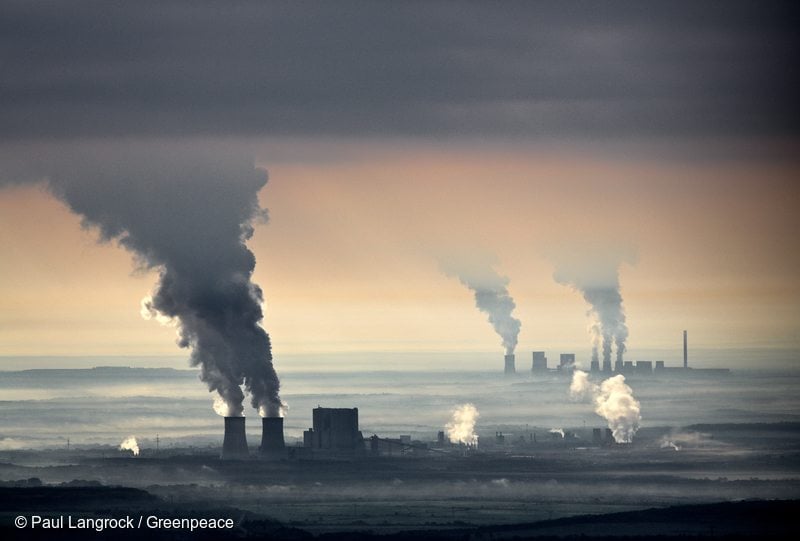(Greenpeace) This week, Greenpeace Switzerland joined with the Unfriend Coal network to release a new report card that shines a spotlight on leading U.S. and European re/insurance companies’ climate-related policies and behavior, acknowledging the industry’s leaders while exposing the laggards.
The companies were scored based on their commitments to a.) divest from coal and other fossil fuels; b.) cease from underwriting dirty energy projects; c.) invest in clean energy; and, d.) lead the fight against climate change. Consideration was also given to how transparent the companies have been.
With minor exceptions, U.S. insurers scored poorly across the board. U.S. re/insurance companies lag behind their European competitors, which have collectively divested $20 billion from coal and started to limit insurance services for coal-related projects.
American insurers, by contrast, have taken no meaningful action to stop underwriting or investing in new dirty energy projects, such as pipelines, or sever themselves from the biggest source of climate destroying CO2 emissions (coal). (According to a 2016 analysis by CERES — a leading investor climate advocacy group — 40 U.S. insurers were even more strongly invested in the coal sector than average investors.)
Some — including AIG, Liberty Mutual and Berkshire Hathaway — refused to participate or did not respond to the Unfriend Coal questionnaire about which policies they have to limit support to fossil fuels.
Risky Business: “The Numbers Speak for Themselves”
In recent weeks, what many big re/insurance companies have begun to report are higher-than-expected claim costs due to this year’s unusual number of severe weather events, which scientists say were made worse by climate change.
This past week, for example, Berkshire Hathaway announced $3 billion in natural disaster-related losses, and that it was on course for its first ever insurance underwriting loss in over 15 years. As Bloomberg reports, these developments should cause industry leaders to second-guess their assumptions: “Contrary to [Berkshire Hathaway CEO] Warren Buffett’s view that climate change will spur demand for coverage and boost profit at his insurance companies, the risk is the opposite unfolds as shifting weather patterns render disaster-prone areas uninsurable.”
“We’re living in a world where risk is growing exponentially,” says Tom Herbstein of ClimateWise, an industry-backed insurance project at the University of Cambridge. “Climate change fundamentally challenges the existing insurance business model because it is rendering actuary analysis in many places obsolete.”
“It’s a big concern of Swiss Re that there’s such a huge gap between the economic losses and what is insured,” said Peter Zimmerli, the head of atmospheric perils at Swiss Re, the second-biggest reinsurer. “Some of the signals of global warming are just there — they can’t be debated any more.”
If climate risks should concern the industry, its shareholders and policyholders, the threat of insolvency should also concern U.S. taxpayers, given that they are the “ultimate insurers” of too-big-to-fail financial institutions, like AIG, which was already bailed out less than a decade ago.
In fact, the onus of bearing the expense of rebuilding after hurricanes, floods and earthquakes already falls disproportionately on taxpayers — through increasingly expensive government programs such as the National Flood Insurance Program, which was already sinking before this year’s hurricanes nearly bankrupted it.
Insurers are only on the hook for about 10 percent of the estimated $75 billion in damages caused by flooding after Hurricane Harvey in Texas, according to AIR Worldwide. That’s because most standard U.S. home insurance policies don’t cover flooding. With government programs weak and dysfunctional, the impacts are even worse for the minority and low-income communities that were hit hardest.
And so taxpayers will foot most of the bill for the fifteen catastrophes that resulted in over $1 billion in federal and private insurance claims within the first nine months of 2017, according to the National Oceanic and Atmospheric Administration’s (NOAA) National Centers for Environmental Information.
“We expect these costs will continue to rise in the future due to both an increase in exposed properties in harm’s way and the increase in the frequency and intensity of some types of extreme weather that leads to costly disasters,” saysNOAA spokesperson Brady Phillips.
While the Trump administration and Congress continue to stick their heads in the sand, leading U.S. fiscal authorities have been issuing warnings about these economic impacts. In a report released on Oct. 23, the Government Accountability Office concluded that extreme weather and fire events cost the federal government $350 billion over the last decade, including the expense of disaster assistance, and flood and crop insurance losses. This doesn’t include damage from this year’s hurricanes and fires or the cost to private insurers, such as the companies surveyed in the new report.

These costs will only continue to climb as climate change intensifies. A year ago, the Office of Management and Budget warned that climate change related damages from extreme weather events would cost U.S. taxpayers an additional $12 to $35 billion per year by 2050.
While the federal government shares responsibility with states for disaster recovery efforts, it is state governments that bear primary responsibility for regulating the U.S. re/insurance industry. For that reason, it will largely fall upon them to begin to connect the dots and question the re/insurance industry’s climate-related investments — and that has already begun to happen. In early 2016, for example, California Insurance Commissioner Dave Jones called on the industry to voluntarily divest from coal and further disclose their climate-related policies.
While U.S. insurers have been slow to respond to such calls, leading European companies have already taken steps — some of them significant — to sever their connection to the fossil fuel industry. Zurich, for instance, announced this week that it will divest from and cease offering insurance to companies that depend on coal for more than 50 percent of their business. It now has some of the strongest policies on the new scorecard, which rates 25 of the world’s biggest insurers on their action around coal and climate change.
Swiss Re and Lloyd’s have informed Greenpeace and Unfriend Coal that they will announce new policies in the coming months. In all, 15 insurers with over $4 trillion in assets[1] have now taken, or are planning action, on coal — divesting an estimated $20 billion in equities and bonds or ceasing to underwrite projects.
While it’s encouraging to see the growing shift away from coal, these early movers still need to do more, and most insurers have yet to do anything to address the dangerous risks surrounding climate change.
 So far, no insurer has taken steps to cease underwriting or divest from all fossil fuels. Some — such as Swiss Re — have adopted policies that avoid underwriting projects that pose enormous environmental risks, such as tar sands extraction and Arctic drilling. But as a rule, the insurance sector continues to be utterly non-transparent regarding the underwriting of specific transactions.
So far, no insurer has taken steps to cease underwriting or divest from all fossil fuels. Some — such as Swiss Re — have adopted policies that avoid underwriting projects that pose enormous environmental risks, such as tar sands extraction and Arctic drilling. But as a rule, the insurance sector continues to be utterly non-transparent regarding the underwriting of specific transactions.It’s particularly disturbing that no U.S. insurer has pursued meaningful action, while industry giants such as Berkshire Hathaway, AIG, Liberty Mutual and Chubb remain completely silent about the catastrophic climate risks affecting their clients.
This inaction by U.S. insurers, along with their near total silence when it comes to advocating for climate action — especially at a time when President Trump tries to drag the country into the dark depths of climate denial — is completely unacceptable and almost reeks of complicity.
How climate friendly do you think is your insurance company?
[1]The $4 trillion only includes assets covered by coal divestment decisions, not all assets managed by the re/insurance companies.
By Katya Nikitenko

















I do not know if it’s just me or if everyone else
experiencing isses with your blog. It appeas as if some of the written text
in your posts are running off the screen. Caan somelne else please comment and let me know
if this iss happening to them too? This could be a issue with my web browser because I’ve had this happen before.
Cheers
Hi Baju! Can you email us a screenshot at [email protected] and let us know what browser you are using when you see that problem? Thank you for informing us!